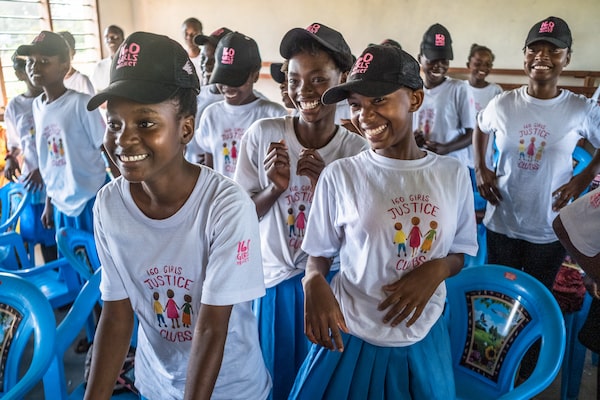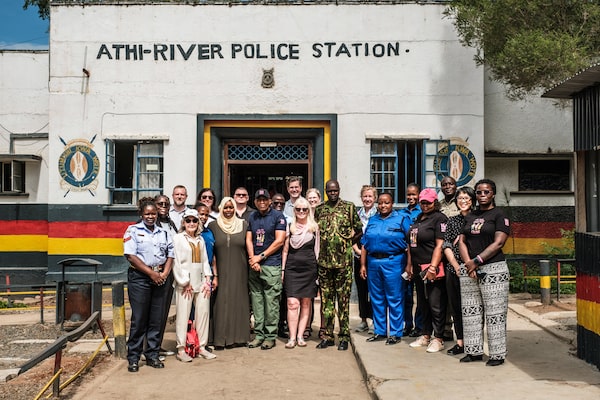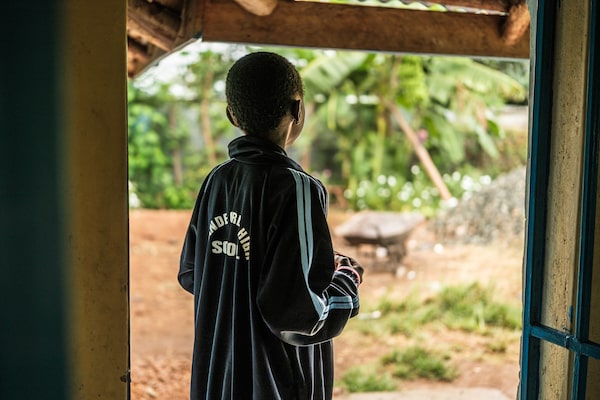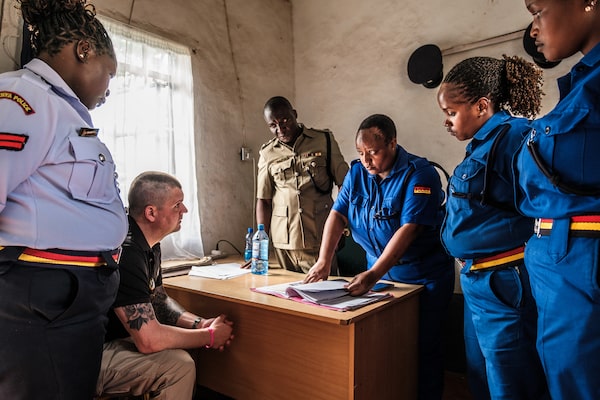
These are changemakers, writes Sally Armstrong: Leaders of the Virtual Justice Clubs, which allowed children to talk about the consequences of sexual assault, are pictured at Gede Primary School in Kilifi County, Kenya, in 2022.Brian Otieno
Sally Armstrong is a journalist, author and human-rights activist. Her latest book, written with Sima Samar, is Outspoken: My Fight for Freedom and Human Rights in Afghanistan.
Homa Bay is an old lakeside town in western Kenya, where seagulls soar over the waters of Lake Victoria and women walk home from market with baskets of goods balanced on their heads. Cows bawl in the fields, small chicks wander in the tall grass, and the merciless noonday sun, on this day, is dampened by a morning downpour.
A winding lane covered by lush red earth leads to a pretty blue house where I meet a nine-year-old girl who shares a heartbreaking story. Last November, she followed the path from her own home through the rows of nightshade blooming with delicate purple flowers and bright yellow berries to her beloved grandma’s house. On the way, she was stopped by a man who asked her to come with him. She knew better than to follow a stranger, but he grabbed her, wrapped a cloth around her mouth to prevent her from screaming, and sexually assaulted her so brutally she required surgery. Before leaving her wounded and terrified, he smashed her eyes with stones so she would never be able to identify him.
A winsome little girl with dimples on her cheeks and an infectious smile, she tells me she loves to read, to run in races, and that she plans to be a pilot when she grows up. While the shame and suffocating stigma of being raped initially kept her family from reporting the assault to the police, the rape made the evening news, and one of the girl’s classmates went to visit her friend.
“Silence is not going to help you, or us,” said the friend. The girl and her mother decided to report the assault; at the police station, she was able to describe the rapist so perfectly that the officers knew almost immediately who he was.
Her eyesight was saved, the injuries around her eyes are improving, and the colostomy she’d required will soon be reversed. But perhaps the biggest part of the healing comes from justice.

A remarkable team: The Kenyan and Canadian police officers, lawyers, researchers and techies gather at a police station in the suburbs of Nairobi.BRIAN OTIENO
For a long time, Kenyan girls and women who are victims of sexual assault were unlikely to find justice. But over the past 14 years there has been a profound shift in how the country’s police and courts handle these crimes – a shift that can be traced back to a brave 12-year-old girl named Milly, who stood up at a village meeting in 2010 and made a shocking confession to her neighbours.
“I want to go to school, but I can’t go to school because I am pregnant,” she said. And then, pointing toward the perpetrator, who was sitting a few feet away, said: “I’m pregnant because that man raped me.”
Her words launched a precedent-setting lawsuit: In 2012, 160 girls between the ages of 3 and 17 sued the government for failing to protect them from being raped. They won. The High Court of Kenya found that the police treatment of child rape (called defilement in Kenya) was unconstitutional and ruled the human rights of these girls had been violated because the police failed to arrest the perpetrators.
The case actually began in a coffee shop in Toronto a year after Milly had been defiled when a social worker and a few human-rights lawyers from Kenya and Canada got together after a meeting at the University of Toronto. A casual discussion about human rights for girls led to astonishing facts: In sub-Saharan Africa, too many men think that having sex with a little girl will cure you of HIV AIDS. The raping of girls had become endemic. Mercy Chedi Baidoo, who runs a Kenyan women-and-children protective organization called Ripples, told Milly’s story. The conversation morphed into action.

One nine-year-old child was sexually assaulted so brutally she required surgery. But perhaps the biggest part of the healing, writes Sally Armstrong, comes from justice.BRIAN OTIENO
Fiona Sampson, who was at that gathering, is the chief executive of The Equality Effect, a Canadian NGO that uses human-rights law to make the rights of girls and women real so they can be safe from sexual violence, get an education and fulfill their economic potential. She is also a thalidomide survivor, so she knows a thing or two about impunity. Ms. Sampson decided to lead the team seeking justice for girls.
Two years later, the courtroom had hardly emptied when the Kenyan and Canadian women knew that justice for the girls meant retraining the police force of Kenya. Not only that, the girls wanted to leave a legacy – they wanted a program for all the children in Kenya to better understand human rights and the consequences of sexual assault and abuse. But retraining the police would require tremendous experience and sensitivity; the lawyers wondered who would take on the task? Then the sexual-assault squad of the Vancouver police force stepped up: Inspector Tom McCluskie and his partner, Sergeant Leah Terpsma went to Kenya to help train their African counterparts. Meanwhile, Delaine Hampton, a professor at the University of Toronto Rotman School of Management, took up the girls’ request for legacy. She handed their story to her MBA class, put them in touch with the girls remotely and said, “Figure it out.” The resulting initiative, called Justice Clubs, allowed both boys and girls to talk about the consequences of sexual assault. When the pandemic struck, Toronto tech wizards Clayton Partridge and Teunis Vorsteveld took the program – now dubbed Virtual Justice Clubs (VJCs) – online and quadrupled its reach.
In February, the actors in this human-rights drama gathered in Nairobi – coincidentally, only days after the largest march against gender-based violence in Kenya’s history took place across the country. There were lawyers and police officers, researchers and techies – all of them volunteers – along with the girls and boys who claim they are writing the playbook for human rights and justice. I was there, too. I’ve been following this story for 14 years – ever since hearing about Milly’s defilement from Fiona Sampson. At the beginning it was about wounded girls who could hardly speak of the agony they had suffered and the families who had rejected them because of the shame attached to rape and a culture of impunity that made justice seem like a pipe dream. I saw no miracle cure but, each time I returned, the girls sounded less like victims and more like changemakers.

Sergeant TJ McCluskie from the Vancouver Police Force meets with his colleagues in Kenya to check the files prepared for a court case.BRIAN OTIENO
This time I met girls – and boys, too – who are self-aware and full of confidence. They knew about the concept of consent and what the law says about defilement. They expected the police to be professional. I watched as a group of them rushed off with Kula Roba Wako, the irrepressible national co-ordinator of the program now dubbed The 160 Girls Project, and danced in a conga line singing their mantra, “donty-touchy,” acting out their demand that “my body is mine.” Their energy and conviction was contagious. Even the prosecutors and judges I spoke with told me these kids have made a difference.
“Of course the number of cases being brought to the court has increased, and, yes, the number of convictions has increased,” said Judge Helen Onkwani. “But, importantly, what we are seeing today is justice for the girls. The decrease in rape culture will come later.”
Sergeant TJ McCluskie, who took over the police training from his now-retired father, agreed with the judge. “The work done by the Kenyan police officers and our team in Canada has paid off in spades. Together we carefully go over the details so that the court case will be a success.” He and his Kenyan colleague Alex Otieno each put in a full shift at their day jobs and then come together (factoring in a 12-hour time difference between Nairobi and Vancouver) to go over the case files. They check every document, check for mistakes, check that the officer visited the crime scene, collected evidence and has prepared the case properly for court. Today, 81 per cent of cases are heard before the courts within three months, making Kenya a world leader.
From what I have seen from Afghanistan and Iraq to university campuses across North America, the response to sexual assault is inadequate. And that poses a question – what’s missing? Why is it that we cannot alter the statistics on sexual assault? The solution I found here in Kenya was astonishing in its simplicity – market research. It’s a tried-and-true method to test everything from coffee preferences to cars, so, these researchers who have joined the 160 Girls team tell me, why not use research to solve this problem. As Alyson Kelley, a researcher from Toronto explained: “We pose the research questions to the police, to the girls and to the community and we use that data to draw conclusions. There were no templates to use, we had to take our experience as market researchers and adapt it to measures we needed. This did not exist before. The objective is to make human rights real.”
In Homa Bay, population 44,000, more than 5,000 girls are part of the VJCs. Previously less than 1 per cent of rape cases were being reported and 46 per cent of the defiled girls never returned to school because of ostracism or sexually transmitted diseases or grievous injuries caused by rape. In fact, of the 160 girls I met in 2011 when they were preparing to take their case to court, 10 per cent have died. Today, the VJCs are the pushback girls have been waiting for.
“We never realized we were changing how they think of themselves, not only with improved confidence and knowledge of human rights, but also by working with tablets that improved their technical literacy,” said Rotman’s Delaine Hampton. And Alyson Kelley told me: “This is making a direct impact on children’s human rights. It’s a model that can be reapplied.”
As Judge Patricia Nyaundi said, “the 160 Girls program prepares young people to tackle sexual-assault issues. The Virtual Justice Clubs are the vehicle to empower girls and boys. This generation fully appreciates that when someone attempts to trample your rights, you organize, mobilize and stand up to the system and demand your rights.”
Everyone agrees this is the route to justice and human rights for girls.
And it is. This year, The Equality Effect has been invited by 11 countries, as well as Indigenous communities in Canada, to launch the same program.
For me, the 14 years have been a remarkable odyssey. Once in a very long while, maybe once in a lifetime, you get to witness a story that shifts the way an entire country sees itself.
For Fiona Sampson, the difference they’ve made is profound: “Milly asked what her village would do about it. This is what we did.”